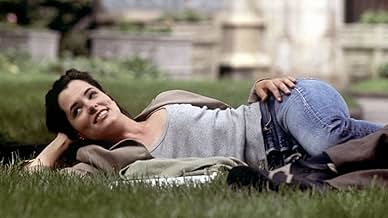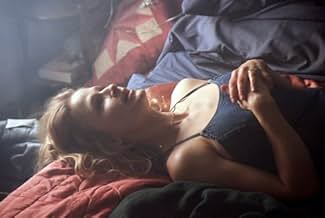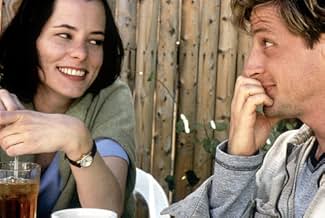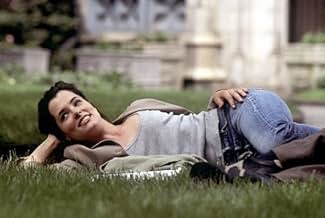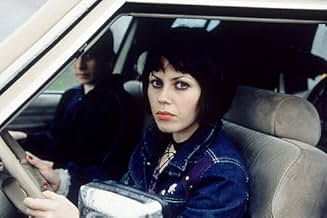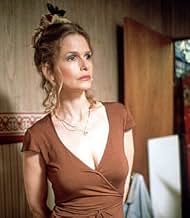Three women's escapes from their afflicted lives. Each struggles to flee from the men who confine their personal freedom.Three women's escapes from their afflicted lives. Each struggles to flee from the men who confine their personal freedom.Three women's escapes from their afflicted lives. Each struggles to flee from the men who confine their personal freedom.
- Awards
- 6 wins & 5 nominations total
John Ventimiglia
- Narrator
- (voice)
Joel de la Fuente
- Thavi Matola
- (as Joel De La Fuente)
Featured reviews
Writer and director Rebecca Miller(daughter of legendary playwright Arthur) patches together three stories of three different women for this film and the movie itself is quite an intriguing curiosity for it.
Delia(Kyra Sedgwick,familiar yet still distinctive here)is an abused housewife and mother who's only known really one thing about herself-her sexuality-and has to find a way out of her sad,low-esteemed predicament,while wondering if she should use her sexuality or not; Greta(Parker Posey,for whom the type of roles she could inhabit are practically limitless) is a career-driven woman whose marriage is peaceful but uninspiring; and Paula(Fairuza Balk,whose angry eyes and wild visage is an ironic contrast to the scared character she's playing),has escaped a horrifying accident and now aids a runaway teen,all the while mindful of the fact that she's just learned she's pregnant.
I must say I was quite pleased with elements of the movie:the narration,the anthology of it and,of course,the actors,who all are very fine here. But I suppose what left me dry here was the way these stories played out. I will not go into any detail so as to inadvertently throw out spoilers,but it to me felt like these stories were resolved in ways that seemed only evident to the writer herself. I read one reviewer describe these tales as sorts of "Women's lib" stories,and that may be true,and not being a woman myself and certainly not a feminist,I suppose if these endings seemed lost on me,well,that's my problem I suppose.
Not a movie for those who absolutely NEED their films to have a sort of set,rising-plot/climax/denouement model in order to digest their usage of 90 min to 2 hours of time,but I suspect that the film's creator doesn't really care about that. She set out to portray three ordinary yet intriguing characters and,for the most part,I feel like she succeeded.
Delia(Kyra Sedgwick,familiar yet still distinctive here)is an abused housewife and mother who's only known really one thing about herself-her sexuality-and has to find a way out of her sad,low-esteemed predicament,while wondering if she should use her sexuality or not; Greta(Parker Posey,for whom the type of roles she could inhabit are practically limitless) is a career-driven woman whose marriage is peaceful but uninspiring; and Paula(Fairuza Balk,whose angry eyes and wild visage is an ironic contrast to the scared character she's playing),has escaped a horrifying accident and now aids a runaway teen,all the while mindful of the fact that she's just learned she's pregnant.
I must say I was quite pleased with elements of the movie:the narration,the anthology of it and,of course,the actors,who all are very fine here. But I suppose what left me dry here was the way these stories played out. I will not go into any detail so as to inadvertently throw out spoilers,but it to me felt like these stories were resolved in ways that seemed only evident to the writer herself. I read one reviewer describe these tales as sorts of "Women's lib" stories,and that may be true,and not being a woman myself and certainly not a feminist,I suppose if these endings seemed lost on me,well,that's my problem I suppose.
Not a movie for those who absolutely NEED their films to have a sort of set,rising-plot/climax/denouement model in order to digest their usage of 90 min to 2 hours of time,but I suspect that the film's creator doesn't really care about that. She set out to portray three ordinary yet intriguing characters and,for the most part,I feel like she succeeded.
The best thing about this film are the three superb performances by the lead actresses in each segment. It's also a chance to explore the potential for short form film narrative by putting three short films together to create a full length feature. If these three films had been produced individually, almost no one would ever see them. The film is exciting too, as an example of the artistic possibilities of low budget digital film making. As others have mentioned the narration almost sinks the movie. I'd love to see a DVD alternative version without it.
I saw this film tonight at the First Annual Tribeca Film Festival and understood its success at Sundance. In short, this film is about the awakening of three different women in very different lives and circle around a news report of a shooting in Manhattan and an ensuing car accident. With the telling of each woman's tale, Miller uses a brilliant 'degree of relation' to the accident in order to develop an engaging and powerful film.
Delia casually watches the news report of the accident while waiting for the cook to bring up her next order in a small-town diner in upstate New York. Though the audience does not see a particularly unusual response that she has to it, we can imagine that her difficult circumstances allow her to relate to it on a level of shared human suffering.
Greta, who's story is told in a series of flashbacks, watches it on the morning news minutes before she has her epiphany about her failing marriage and the new turn that her life is taking as a prominent editor for a large Manhattan publishing house. Because it is the only scene in her story that takes place in the present time, the audience is left to wonder what sort of pivotal role the news report has played in her epiphany.
Finally, Paula's story brings the accident close to home as she is a witness to it. Her epiphany was a direct result of the accident since it was a near-death experience for her. She's not only shocked from the impact of it, but her struggle to explain it with cosmic signs allows her to transcend the accident and the events following it.
The performances were real, the direction was brilliant, and the common thread that ran through the intimate details of the women's awakenings flowed easily, despite the segmented telling of their tales. Miller's work in this film has inspired me to seek out her feature debut, _Angela_ as well.
Delia casually watches the news report of the accident while waiting for the cook to bring up her next order in a small-town diner in upstate New York. Though the audience does not see a particularly unusual response that she has to it, we can imagine that her difficult circumstances allow her to relate to it on a level of shared human suffering.
Greta, who's story is told in a series of flashbacks, watches it on the morning news minutes before she has her epiphany about her failing marriage and the new turn that her life is taking as a prominent editor for a large Manhattan publishing house. Because it is the only scene in her story that takes place in the present time, the audience is left to wonder what sort of pivotal role the news report has played in her epiphany.
Finally, Paula's story brings the accident close to home as she is a witness to it. Her epiphany was a direct result of the accident since it was a near-death experience for her. She's not only shocked from the impact of it, but her struggle to explain it with cosmic signs allows her to transcend the accident and the events following it.
The performances were real, the direction was brilliant, and the common thread that ran through the intimate details of the women's awakenings flowed easily, despite the segmented telling of their tales. Miller's work in this film has inspired me to seek out her feature debut, _Angela_ as well.
I am hard-pressed to explain the praise heaped on this movie, and must sadly choose the obvious. This film would never have been touted as it has if it were made by someone other than Arthur Miller's daughter/Daniel Day Lewis's wife.
Of the film's three vignettes--domestic violence survivor, conflicted editor, and confused runaway--the second is most telling. Greta, the failure to her family, craves success and power in the literary world and only needs to have her innate talents recognized to do so. Her skill is "trimming the fat" from others' writing. However, Ms. Miller seems to have had no such attention paid to her own work. The incessant and intrusive voiceover dialogue, I assume taken directly from her collection of short stories, features pseudo-deep lines that made me literally laugh out loud.
In addition, I found many of the camera tricks and plot devices amateurish and the characters shallow and essentialized. I cannot recommend this film, which basks in its own specialness and its claims to gritty reality. Ms. Miller is a tourist in the lives of the struggling women she attempts to portray.
Of the film's three vignettes--domestic violence survivor, conflicted editor, and confused runaway--the second is most telling. Greta, the failure to her family, craves success and power in the literary world and only needs to have her innate talents recognized to do so. Her skill is "trimming the fat" from others' writing. However, Ms. Miller seems to have had no such attention paid to her own work. The incessant and intrusive voiceover dialogue, I assume taken directly from her collection of short stories, features pseudo-deep lines that made me literally laugh out loud.
In addition, I found many of the camera tricks and plot devices amateurish and the characters shallow and essentialized. I cannot recommend this film, which basks in its own specialness and its claims to gritty reality. Ms. Miller is a tourist in the lives of the struggling women she attempts to portray.
This film, directed and written by Rebecca Miller, is a very satisfying experience for a new director who, here, is adapting her own material with a lot of relish and savoir-faire. There's a certain elegance in the way she treats her characters, always respectful, yet incisive. The only complain we could raise is the fact that each story is very short, so when we are still savoring each one, individually, Ms Miller, for reasons of timing, pulls them from under us.
The first story, Delia, shows a woman's worst fears in being married to a wife beater of the worst kind. She might have had dreams of making a happy home for her family, but her man has another thing in mind. This woman is a step above white trash. She tries hard to get herself together but everything keeps interfering with her independence. Played with gusto by Kyra Sedwick, Delia ends up as a waitress in order to support herself and the children. Her encounter with the bully from the restaurant is an exercise in how low they want her to go, but she comes out a winner.
The second story, Greta, is the best of the three. With the help of the great Parker Posey, this Greta comes out as the tough woman she wants everyone to think of her, but deep down, inside her, she's a vulnerable and frightened and unfulfilled over achiever. Ms Posey has never shown so many nuances in a performance that is so economic in the terms that are dictated by the length of the story. We get to know more about her than the narrator ever tells us. Every expression on this actress face is true. It's surprising what has been achieved here with the collaboration of the director and the player.
The last story, Paula, is the weakest. It's all about a very confused young woman who's out on the road to see her parents. She has very deep problems. Along the way she picks up a hitchhiker who stays with her through the trip. Paula is in a voyage of discovering, but little does she know that what she needs is what she has left at home: her Haitian man, who obviously cares a lot about her. As played by Fairuza Balk, she shows the turmoil in her head that only she can resolve.
We hope Miss Miller's next time out will be very soon because she's got a feel for getting inside her characters and finding angles they didn't even suspect of having.
The first story, Delia, shows a woman's worst fears in being married to a wife beater of the worst kind. She might have had dreams of making a happy home for her family, but her man has another thing in mind. This woman is a step above white trash. She tries hard to get herself together but everything keeps interfering with her independence. Played with gusto by Kyra Sedwick, Delia ends up as a waitress in order to support herself and the children. Her encounter with the bully from the restaurant is an exercise in how low they want her to go, but she comes out a winner.
The second story, Greta, is the best of the three. With the help of the great Parker Posey, this Greta comes out as the tough woman she wants everyone to think of her, but deep down, inside her, she's a vulnerable and frightened and unfulfilled over achiever. Ms Posey has never shown so many nuances in a performance that is so economic in the terms that are dictated by the length of the story. We get to know more about her than the narrator ever tells us. Every expression on this actress face is true. It's surprising what has been achieved here with the collaboration of the director and the player.
The last story, Paula, is the weakest. It's all about a very confused young woman who's out on the road to see her parents. She has very deep problems. Along the way she picks up a hitchhiker who stays with her through the trip. Paula is in a voyage of discovering, but little does she know that what she needs is what she has left at home: her Haitian man, who obviously cares a lot about her. As played by Fairuza Balk, she shows the turmoil in her head that only she can resolve.
We hope Miss Miller's next time out will be very soon because she's got a feel for getting inside her characters and finding angles they didn't even suspect of having.
Did you know
- TriviaMaria Elena Ramirez's debut.
- Quotes
Greta Herskowitz: How could he still love me? If he does, it's because he doesn't know me. I'm rotten with ambition, a lusty little troll, the kind of demon you'd find at the bottom floor of hell pulling fingernails off the loansharks.
- Crazy creditsTo my mother
- ConnectionsFeatured in Personal Velocity: Creating 'Personal Velocity' (2003)
- How long is Personal Velocity?Powered by Alexa
Details
Box office
- Budget
- $125,000 (estimated)
- Gross US & Canada
- $811,299
- Opening weekend US & Canada
- $29,943
- Nov 24, 2002
- Gross worldwide
- $890,502
- Runtime1 hour 26 minutes
- Color
- Sound mix
- Aspect ratio
- 1.85 : 1
Contribute to this page
Suggest an edit or add missing content

Top Gap
By what name was Personal Velocity: Three Portraits (2002) officially released in India in English?
Answer

